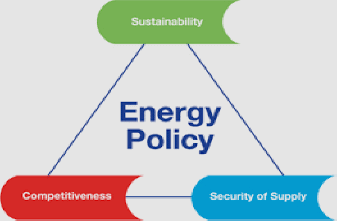Energy Policies

The Importance of Energy Policies

Energy policies
play a vital role in supporting renewable energy and enhancing energy
efficiency. These policies guide the global transition from fossil fuels
to cleaner, more sustainable energy sources. Governments worldwide are
enacting regulations and funding projects to benefit the environment and
promote the adoption of renewable energy technologies.
Financial Incentives for Renewable Energy
Governments often provide financial incentives to individuals and businesses that invest in renewable energy systems such as solar panels or wind turbines. These incentives, which may include tax credits and rebates, help reduce the initial costs of renewable energy systems, making them more accessible and appealing. By lowering the financial barriers, these incentives encourage broader adoption of clean energy technologies
Financial Incentives for Renewable Energy
|
Incentive |
Description |
Benefits |
|
Tax Credits |
Reduces the amount of tax owed for renewable energy investments |
Lowers initial costs of
installation |
|
Rebates |
Refunds a portion of the cost after purchase or installation |
Makes renewable energy systems more affordable |
|
Grants |
Provides direct funding for renewable energy projects |
Supports larger-scale adoption |
Renewable Portfolio Standards (RPS)
Energy policies frequently include laws mandating that a certain
percentage of energy comes from renewable sources. Renewable Portfolio
Standards (RPS) require utilities to produce or purchase a specified
portion of their electricity from renewable sources like wind, solar,
and hydroelectric power. These regulations drive demand for renewable
energy, spurring investment and development in the sector, and play a
critical role in advancing clean energy goals.
Long-Term Goals and International Cooperation
Setting long-term goals for renewable energy use and energy efficiency
is essential for a sustainable future. For example, the European Union's
Green Deal aims to make Europe climate-neutral by 2050, with substantial
investments in renewable energy infrastructure and support for
communities transitioning away from fossil fuels. International
cooperation is also crucial in these efforts. The Paris Agreement, a
global pact to combat climate change, brings countries together to
reduce greenhouse gas emissions and share clean energy technologies. By
setting common goals and sharing best practices, countries can
collaborate more effectively to address global energy challenges.
Ensuring Access to Affordable and Reliable Energy
Energy policies should ensure that everyone has access to affordable and
reliable energy, particularly in low-income communities. Access to
affordable energy is crucial for reducing poverty and improving living
standards. Policies can support programs that provide financial
assistance for energy-efficient home upgrades, which can lower energy
bills for low-income households. Additionally, investing in renewable
energy projects creates job opportunities in manufacturing,
installation, maintenance, and research, further contributing to
economic growth.
Promoting Energy Justice
Promoting energy justice is a key aspect of effective energy policies.
This involves ensuring that the benefits of clean energy and efficiency
improvements are distributed fairly across all communities. Historically
marginalized communities, often disproportionately affected by pollution
and high energy costs, should be prioritized in these efforts. Policies
should focus on investing in clean energy projects within these
communities and involving them in decision-making processes to ensure
their needs are addressed.
Conclusion: The Role of Effective Energy Policies
In conclusion, effective energy policies are critical for supporting the
transition to renewable energy and improving energy efficiency. By
setting clear goals, providing financial incentives, and fostering
international cooperation, governments can drive the adoption of clean
energy technologies and reduce greenhouse gas emissions. Ensuring access
to affordable and reliable energy, creating jobs in the clean energy
sector, and promoting energy justice are essential components of a
sustainable and equitable future.